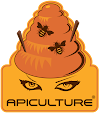Friday, February 26, 2010
Advise from Cindy Bee at the last MABA for new beekeepers
Cindy Bee discussed what’s going on in the hive currently, and told the audience that when temperatures rise to the 50’s, feed the bees a 2:1 syrup (that’s 2 parts sugar; 1 part water) Feed the bees internally inside the top cover, either on top of the frames or on the inner cover.
For those people getting their first nucs this spring, never put the bees on the ground. Have the hive ready prior to the arrival of the nuc. Keep the bees in a cool place until you are ready to put them in the hive. You install the bees just before dark.
Subscribe to:
Post Comments (Atom)






1 comment:
Friday, February 26, 2010
Small Hive Beetle Question Answered
Cindy Bee told Cassandra Lawson that the Decatur High School Community Garden compost pile may be contributing to the higher Small Hive Beetle problems Cassandra was experiencing in the garden CSX Hive (a swarm captured at the CSX railroad yard). I said hummm... as I had never read that. While at a group meeting at the San Francisco Coffee House, Jerry Wallace was hit with the question after telling him about Cindy telling Cassandra about the compost pile. He was like me....hummmm..... So I emailed Jennifer Berry with the question. See the response. Very interesting.
Re: Small hive beetles in compost piles
Jennifer,
We have a hive at a community garden. Someone said the compost pile will attract hive beetles and that will cause a heavy hive beetle population in our hive. I have nerver heard that before. What do you know?
Thanks for the feedback!!!
John Jones
Stone Mountain, Ga.
404 319 6279 cell phone
Hey John,
Have also heard this about compost bins but nothing in the research. However, I have a yard were there is a large community garden and compost pile, and my beetle load is much higher in that yard than others, but haven't done any hard data collecting to see if in fact they are reproducing in the compost. Just get your beetle eaters or beetle buster traps in early (near the cluster now and then later when it becomes warmer in the upper corners of the supers or where you are seeing the most beetles). Plus, colonies in full shade have more beetle issues than ones more in the sun.
Take care
Jennifer
Jennifer Berry
Research Professional III
UGA Honey Bee Lab
1221 Hog Mountain Rd.
Watkinsville, Ga 30677
706-769-1736
www.ent.uga.edu/bees
From: John Jones
To: Jerry Wallace
Sent: Friday, February 26, 2010 7:34 PM
Subject: Fw: Small hive beetles in compost piles
Jerry,
Good group meeting the other night. Remember we talked about hive beetles and compost piles. Cindy Bee had told Cassandra Lawson that compost piles attract hive beetles. I had not heard that and emailed Jennifer Berry. See her reply. INTERESTING........
Later,
John
Jerry's Comments
John,
If they are putting melons/fruit/vegetables or household stuff in the compost pile, I think it possible that beetles might be more of a problem. PN Williams says they reproduce over at the Farmer's Market in the trash dumpsters and he finds it almost impossible to keep bees at his home location. I have also heard that in the South GA counties that produce cantalopes and watermelon that the beetles will quickly overrun a hive (I think Jennifer Berry or Keith Fielder reported this at a meeting several years ago). I compost all my leaves, plant litter, and small fallen sticks 2-3 feet deep at times within 20 feet of my hives and I have never seen increased beetle populations more than elsewhere. I do not put any household materials in the compost. I can say from personal experience that when I process/melt wax outside in the summer hive beetles land frequently on me, especially if near dusk. I do not believe they are coming from my hives which are only 30-40 yards away. I've read that the beetles can smell a hive from 7-8 miles away. I actually don't view beetles as that much of a pest except in the Sep-mid Nov timeframe when they generally seem to have a higer population. I tend to believe most hives that get slimed were going to die anyway due to disease or loss of queen.
Jerry
Jerry Wallace is a long time beekeeper with 25 plus hives and is the current president of the Metro Atlanta Beekeepers Association. He is always fun to talk to.
Post a Comment